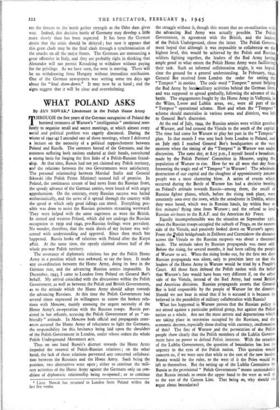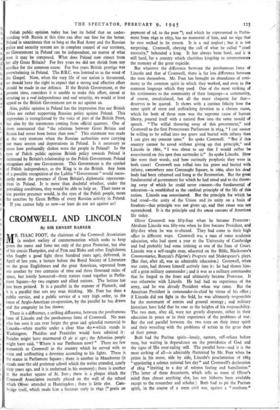WHAT POLAND ASKS
By JAN NOWAK,* Lieutenant in the Polish Home Army HROUGH the five years of the German occupation of Poland the battered remnants of Warsaw's " intelligentsia " continued resolutely to organise small and secret meetings, at which almost every social and political problem was eagerly discussed. During the winter of 194z-42 I attended one of those meetings, where I delivered a lecture on the necessity of a political rapprochement between Poland and Russia. The common hatred of the Germans, and the common suffering both nations endured at their hands, constituted a strong basis for forging the first links of a Polish-Russian friendship. At that time, Russia had not yet claimed any Polish territory, and the relations between the two Governments were satisfactory. The personal relationship between Marshal Stalin and General Sikorski (the Polish Prime Minister) seemed full of promise. In Poland, the continuous stream of bad news from the Russian front, the speedy advance of the German armies, were heard of with angry apprehension. On the contrary, every Russian success was hailed enthusiastically, and the news of it spread through the country with the speed at which only good tidings can ttavel. Everything possible was done to assist the Russian prisoners streaming westward. They were helped with the same eagerness as were the British. In central and western Poland, which did not undergo the Russian occupation in 1939 and 1940, pro-Russian feelings were prevalent. No wonder, therefore, that the main thesis of my lecture was welcomed with understanding and approval. Since then much has happened. Russia broke off relations with Poland after the Katyn affair. At the same time, she openly claimed almost half of the whole pre-war Polish territory.
The severance of diplomatic relations has put the Polish Home Army in a position which was awkward, to say the least. It made any co-ordination between the-Home Army, doing its best in the German rear, and the advancing Russian armies impossible. In December, 5943, I came to London from Poland on General Bor's behalf. My arrival coincided with the discussions within the Polish Government, as well as between the Polish and British Governments, as to the attitude which the Home Army should adopt towards the advancing Russians. At this time the Polish Government had several times expressed its willingness to renew the broken relations with Moscow, mainly stressing the urgent necessity of the Home Army's co-operation with the Russian troops. Russia persisted in her refusals, accusing the Polish Government of an " unfriendly " attitude. In Moscow both official and propaganda utterances accused the Home Army of reluctance to fight the Germans, the responsibility for this hesitancy being laid upon the shoulders of the Polish Government in London, under whose orders the whole Polish Underground Movement acts.
Thus on one hand Russia's distrust towards the Home Army impeded the renewal of Polish-Russian relations ; on the other hand, the lack of these relations prevented any concerted collaboration between the Russians and the Home Army. Such being the position, two alternatives were open ; either to continue the military activities of the Home Army against the Germans only on condition of diplomatic relationship being re-opened ; or to continue
the struggle without it, though this meant that no co-ordination with the advancing Red Army was actually possible. The Polish Government, in agreement with the British, and the leaders of the Polish Underground, chose the latter. The Polish Government hoped that although it was impossible to collaborate on the highest level, this would be achieved by the Polish and Russian soldiers fighting together, the leaders of the Red Army having ample proof to what extent the Polish Home Army were facilitating their task. Such an informal collaboration might, it was hoped, clear the ground for a general understanding. In February, 1944, General Bor received from London the order for setting the " Tempest" in motioa. The code word " Tempest " meant helping the Red Army by localamilitary activities behind the German lines, and was supposed to spread gradually, following the advance of the battle. The engagements fought by the Home Army in Volhynia, in the Wilno, Lwow and Lublin areas, etc., were all part of the " Tempest " operational scheme. Ho* and when the "Tempest" scheme should materialise in various towns and districts, was left to General Bor's discretion.
At the end of July, 1944, the Russian armies were within gunshot of Warsaw, and had crossed the Vistula to the south of the capital. The time had come for Warsaw to play her part in the "Tempest" plan. In that month I was sent back from London to Poland, and on July 19th I reached General Bor's headquarters at the very moment when the timing of the "Tempest" in Warsaw was under discussion. The same day, at 8.55 p.m., I myself heard a broadcast, made by the Polish Patriots' Committee in Moscow, urging the population of Warsaw to rise. How far we all were that day from foreseeing the tragic end of "Tempest" in Warsaw! The wholesale destruction of our capital and the slaughter of approximately 200,000 people was a most shattering blow. A series of events which occurred during the Battle of Warsaw has had a decisive bearing on Poland's attitude towards Russia—among them, the recall of Russian fighter planes, which, before the rising took place, were constantly seen over the town, while the aerodrome in Deblin, where they were based, which was in Russian hands, lay within four or five minutes' flying time from Warsaw ; and the refusal to lend Russian air-bases to the R.A.F. and the American Air Force.
Equally incomprehensible was the situation on September 12th, when the Russian troops occupied the suburb of Praga, on the eastern side of the Vistula, and passively looked down on Warsaw's agony. From the Xolish bridgeheads in Zoliborz and Czerniakow the distance across the Vistula to the Russian outposts was about a thousand yards. The attitude taken by Russian propaganda was most odd. Before the rising, for several months, it had been calling the people of Warsaw to act. When the rising broke out, for the first ten days Russian propaganda was silent, only to proclaim later on that the leaders of the Home Army in Warsaw would be tried by a People's Court. All those facts imbued the Polish nation with the belief that Warsaw's fate would have been very different if, on the other side of the Vistula, instead of the Red Army, had stood British and American divisions. Russian propaganda asserts that General Bor is held responsible by the people of Warsaw for the disaster. Should we not bear in mind that if he is accused it is because he believed in the possibility of military collaboration with Russia?
What has happened in Warsaw proves that the Russian policy is not aimed against a particular political group, but against the Polish nation as a whole. Are not the mass arrests and deportations which are taking place in territories occupied by the Russians, and the economic decrees, especially those dealing with currency, confirmation of this? The fate of Warsaw and the persecution of the Polish people show clearly that the Polish members of the Lublin Government have no power to defend Polish interests. With the creation of the Lublin Government, the question of boundaries has lost its urgency in the eyes of the Polish nation. This question would concern us, if we were sure that while to the east of the new border Russia would be the ruler, to the west of it the Poles would be left to themselves. But the setting up of the Lublin Committee by Russia as the provisional" Polish Government" means unmistakab;y that Russia intends to retain the upper hand to the west as well as to the east of the Curzon Line. That being so, why should We argue about boundaries? Polish public opinion today has lost its belief that an understanding with Russia at this time can alter our fate for the better. Poland is unanimous that as long as the Red Army and the Russian police and security system are in complete control of our territory, no Government in Poland can be independent, no matter of what men it may be composed. What does Poland now expect from her ally Great Britain? For five years we did not shrink from any sacrifice for the common cause. For five years British prestige was overwhelming in Poland. The B.B.C. was listened to as the word of the Gospel. Now, when the very life of our nation is threatened, we should have the right to expect that a strong and effective effort should be made in our defence. If the British Government, at the present time, considers it is unable to make this effort, aimed at securing us a real independence and real security, we would at least appeal to the British Government not to act against us.
Alas, public opinion in Poland has the impression that our British Allies are rather supporting Russian policy against Poland. This impression is strengthened by the voice of part of the British Press, but also by the statements coming from official quarters. One of them announced that "the relations between Great Britain and Russia had never been better than now." This statement was made at the very moment when the Russian authorities were carrying out mass arrests and deportations in Poland. Is it necessary to stress how profoundly shaken were the people in Poland? In the eyes of Polish public opinion British policy towards Poland is estimated by Britain's relationship to the Polish Government. Poland recognises only one Government. This Government is the symbol of Polish independence, as the King is to the British. Any form of a possible recognition of the Lublin " Government " would necessarily mean the presence of Great Britain's diplomatic representatives in Poland. It is more than doubtful whether, under the prevailing conditions, they would be able to help us. Their more or less passive presence would, in the eyes of the Polish people, mean the sanction by Great Br/thin of every Russian activity in Poland.
If you cannot help us now—at least do not act against us!























 Previous page
Previous page